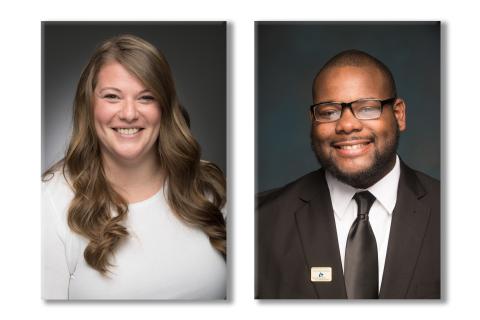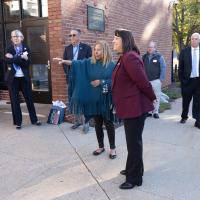
Nicole West and Joseph Seal Encourage Students to Sign Up for Tutoring at the CARE Center

As the academic year approaches, Westfield State’s many support programs are wrapping up their own preparations to welcome students. In particular, the Course Achievement, Retention, and Engagement (CARE) program is preparing to assist a new group of students with their classes by offering workshops, tutoring, and partnering with other campus resources in order to provide a holistic approach to student support. The Center’s mission statement reinforces this by adding they “encourage academic growth and empowerment” in a variety of ways, leading students to do the same for themselves.
Nicole West, Director of the CARE Center, elaborated on what students should expect when soliciting their services. “We were created in January 2022 to become a home for students who might not have had a space where they felt they could go to when they were struggling,” she said. “We’re a space students can walk into and shout, ‘I need help!’”
She also highlighted the benefits of being located in the Ely Library, where students already gather when they need to study. In its second-floor space, the CARE Center offers ample room so students can feel comfortable when coming in and asking for tutoring. “Being located in the Library is great because it really encourages students to be around support networks when they study,” she said. “When a student walks in, they can sit down and either begin to work and utilize the space without needing to say anything to anyone or be right there to ask us for help. We’re here to support them in whatever ways they need.”
Although the CARE Center’s open-door policy was designed for maximum accessibility, West briefly spoke about how not everyone is comfortable asking for help. While staff members often advocate for students to just walk in, students who are less confident or who need accommodations are just as welcome, as CARE has the means to assist students in more than one way.
“This is a judgment free zone,” West said. “There’s no judgment here, but we get it. We get how shameful it can feel when you’re not doing well academically, or when you see others thriving at college. We just want [students] to know that this is a safe space, and that being embarrassed is normal and okay.”
She also invited students to make appointments online. “You can tell [this] to us, and we’ll respect that you might want tutoring or any support we provide to happen in a private space. [Students] are welcome to reach us via email if they’re too anxious to physically come in… so we do take emails.”
Due to the collaborative nature of the program, student-professor communication is reinforced at CARE and frequently a part of the process of tutoring. “Often, a student is doing okay in class,” West said. “They may have gotten one bad grade or missed a week for personal reasons, and missing that week makes them feel like [they’re] behind… even though they were doing well until needing to miss a class. We do encourage the student to go back to the instructor while we’ll be supporting them too.”
Meanwhile, students who either suspect or wonder if they’ll need tutoring should make an appointment as soon as possible. West emphasized the importance of preparation, even if it means making appointments weeks or months in advice.
For example, if finals are a source of stress for students, West encourages them to sign up for tutoring ahead of time. “I always stress to students, understand when you’re doing to need a tutor weeks in advance and request those tutors as soon as you start to feel like you need one,” she said.
Joseph Seal, an Academic Support Coordinator who also works at the CARE Center, reiterates this, as he often tells students, “Be proactive. I want you in the CARE Center signing up for a tutor the first moment [they’re] like, ‘That’ll be hard down the road.’ Come in now.”
Last semester, Seal introduced the Center’s CARE Packages to campus, which were a resoundingly popular with students. “They’re presentations that focus on the different dimensions of wellness,” he said. “They’re hour-long and used in collaboration with other departments on campus. For example, last semester, we had the spiritual CARE package. We had Father Savage from the Interfaith Center come into the CARE Center to talk about how to trust your gut and make informed decisions.”
In addition to the spiritual CARE package, the Center also offers emotional, physical, financial, occupational, social, academic, and environmental “packages” which are free and accessible to anyone who attends.
“We’re a space for everything,” West said. “We work for everybody, essentially. Every service that we offer, workshops, CARE packages… is free.”
Most of all, West’s biggest advice is for students to communicate what they’re experiencing to their friends and loved ones, as campus life is a communal effort and students deserve to feel heard and helped. “It’s always helpful to have a net, a circle of care that you know supports you. Always be talking to them. If you make a relationship with your Orientation Leader and you feel comfortable talking to them, don’t lose that relationship after orientation! Utilizing your resources beyond walking into offices that are here to support you, always talk to someone. Don’t keep things in. Let the people you’re closest with know how you’re feeling.”


